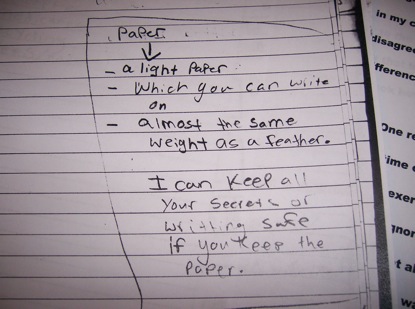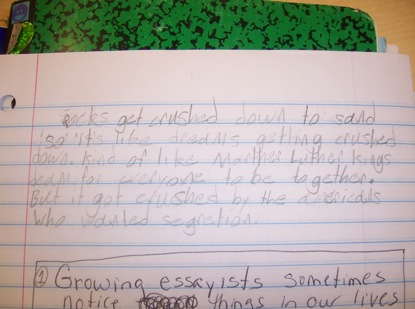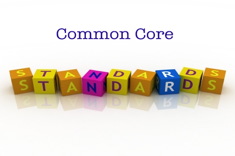Change can be challenging, even scary. My daughter had a tough time getting back into the swing of things after winter break. We would be getting ready for the day and all of a sudden I would see tears well up in her little eyes as she said, "I just want to stay home, Mommy." I get it! I wanted to stay home too, where it's comfortable and safe. We talked, and I realized that she was looking so far ahead she was overwhelmed at the thought of what she needed to do next. "One step at a time," I told her. "All you need to think about is what you're doing right now, in the moment. Just think about getting dressed, then eating breakfast, and then getting on the bus."
The same thing can happen with change in schools — one step at a time calms everyone down, when each step is small. I've been working with a few different grade levels taking a closer look at argumentative, persuasive, and opinion writing in the Common Core. As we've been looking over these new standards, it seems that persuasive writing was often based on an emotional appeal. The expectation now is that students will develop a strong argument, or support an opinion, based on facts and evidence. It doesn't seem like a huge shift, but it is important to note.
For example, here is an excerpt from a student's argumentative writing in one fourth-grade classroom: Beep! Beep! Beep! Be quiet already! I hate these cell phone alarms. They never stop. Then later the same student writes, Kids should be working on homework or exercising. If kids don't exercise they will become lazy and ignore their parents.
Here is another example from a different fourth grader:
Have you ever felt bad when you see your mom in the kitchen all day? Help her out! Kids should have to do chores at home. They help kids turn more responsible, and they let kids have more bonding time with whichever parent is in the kitchen.
One reason kids should have to do chores at home is that they make kids more responsible. They make kids more responsible by teaching them how to do it (chores). For example, if a kid takes out the laundry multiple times, then they will soon understand how to do it (laundry). If kids understand how to do it, then they will do it when they are older.
If you compare these two pieces, one about cell phones and the one about chores, you'll notice that the student piece about cell phones has a more visceral feeling to it, using words like, "I hate these cell phone alarms." Later in the piece the student makes a somewhat exaggerated claim, "If kids don't have exercise they will become lazy." In the piece about chores, a logical argument is built around teaching kids responsibility by having chores, "For example, if a kid takes out the laundry multiple times, then they will soon understand how to do it (laundry). If kids understand how to do it, then they will do it when they're older."
I initially wondered if writing would lack voice if an emotional appeal was taken away, but I think you can see at the beginning of the second piece on chores, this student's voice comes through loud and clear in the lead: "Have you ever felt bad when you see your mom in the kitchen all day? Help her out! Kids should have to do chores at home."
In the Common Core Standards, the word "opinion" is used through fifth grade. For sixth grade and beyond the wording changes to "argument." I'm all about having common language as we think about instruction throughout the grades. The variance in terms begs the question, "What do we call this kind of writing?" In my district we are using both words in referring to this mode of writing, at least for third grade and up. In Appendix C of the standards document are writing samples that give a frame of reference as to what this writing should look like (http://www.corestandards.org/assets/Appendix_C.pdf).
Kindergarten Sample
My fabit book is do you want to be my FRIEND. the mas as the hos if you will be my FRIEND the hos said No. the mas eid a FRIEND the mos as the lutr mos if you will be my FRIEND the latr mas said Yes they Dig a hol in the gan. my fait pot is the hos
[My favorite book is Do You Want To Be My Friend The mouse asks the horse if you will be my friend. The horse said no. The mouse had a friend. The mouse asked the other mouse if you will be my friend. The other mouse said yes, let's dig a hole in the ground. My favorite part is the horse.]
In this first kindergarten sample, the student states "My favorite book is Do You Want To Be My Friend?" Then the child adds an opinion at the end: "My favorite part is the horse."
Second Grade Sample
When you go owling you don't need words, or worm(s) or anything, but hope. This is the book of Owl Moon.
This book is written by Jane Yolen. I like that phrase Because The boy was happy because he got to go owling and hes been wonted to go owling for a long time and he finally got to go.
When other Kids are happy that makes me happy. I like it Because it makes me feel good Because you don't haf't to have words to go owling but you haf't to have hope to see an owl.
This next opinion piece, by a second grader, includes the topic (the book Owl Moon by Jane Yolen) and states an opinion; "I like that phrase because the boy was happy because he got to go owling…" There is also a thoughtful concluding statement, "Because you don't (have) to have words to go owling but you (have) to have hope to see an owl."
Fourth Grade Sample
Wildlife Refuge* Field Trip
Dear Mr. Smith and Mrs. Nieto,
We have a problem. The wildlife here in the city is very limited. There is not a lot of opportunity to learn about conservation and wildlife preservation. If we took a field trip to The Wildlife Refuge our problem would be solved. Trenton, Diego and I would like to take our class for a great learning experience. In addition, we will provide a study guide to students to identify the animals and provide information about conservation of endangered wildlife.
If we went on a field trip, we will learn about the wildlife from around the world and how rivers provide a natural habitat for them to live and breed. This information would help us to understand the importance of science in our day to day life. We would use math to make a budget and figure out a way to earn money. These skills will be very useful again and again. We will learn how to make a schedule with target dates. This will provide us with a plan that covers the entire project from start to finish. The preparation of the study guide will require lots of research and organization of information. The first thing to do is research, research, research! Next, we will choose a fund raiser (with your approval, of course). This will earn money for the field trip. The parents will hopefully chip in their time and money, if we don't get enough. We will prepare a plan schedule. This will provide the dates that team members will need to accomplish the steps toward our goal. My competent adult model is the Unofficial Guide to Walt Disney World. It shows us step by step how to plan a trip and what to see. Now, you are asking why should I approve a trip to The Wildlife Refuge ? How does this improve student learning? Besides the fact that the project planning, fund raising, budgeting and reporting will provide an excellent learning opportunity, it will provide education. It will also provide awareness of wildlife and the importance of conservation. This project will be evaluated by its successful planning and its ability to involve our class in wildlife conservation. The trip will be evaluated by the student participation on the trip and a plan of conservation that identifies what we can all do to protect and respect wildlife so they will still be around when we have children.
Sincerely,
Your student
*fictitious names and places have been inserted in this student's writing
This fourth grade argumentative/opinion piece (which was edited with help from the teacher and peers) sets the stage for a problem with facts and a possible solution. The concluding section supports the opinion. There is even a counter argument paragraph, addressing possible objections to the argument.
Strategies for Teaching Argument and Persuasive Writing
As I've been working with students I've used the metaphor of "the middle child." We want to be diplomatic like a middle child in seeing an issue from both sides, so we can address opposing opinions even before they can be voiced. We are finding it can be difficult for students to be able to see an issue from multiple sides, so it was helpful to have them list pros and cons. We had students get together with partners, and their partner's job was to "poke holes" in their peer's argument. These strategies make for a strong argumentative piece.
Pros of Cellphones (Generated by Student Pair)
communicate
entertain
emergencies
lost
replaces technology
lighter
music
smaller
Cons of Cellphones (Generated by Student Pair)
random calls
random texts
expensive
charging
stranger's trap
too much screen time
We use many of the teaching points from our former "Persuasive Unit," now known as the "Argumentative or Opinion Writing Unit." We just make sure we leave out that emotional appeal and add a counter argument. What we're most concerned about is how to make the writing meaningful and authentic for students. We don't want to give everyone a prompt, but instead are helping students find topics they are interested in that lend themselves to this type of writing.
This year we started the unit by asking students to notice something small or seemingly insignificant in their world, and then had them describe it. After a bit of this freewriting, we pushed students to ask themselves, "What does this make me think of?" and "What big idea could come from this?"
It was amazing to see some of the connections students made. Then we encouraged them to see if they could take this idea and add a shift to develop an argument or an opinion. For some topics this worked, and for some it didn't, but our hope is thatstudents will realize that they have an important message to share with the world.

While this first snippet has a poetic feel to it, it may be difficult turning this into an argumentative piece of writing.
The next piece not only has some powerful ideas, but has potential to address an important social issue.

The text reads: Rocks get crushed down to sand. So it's like dreams getting crushed down. Kind of like Martin Luther King's dream for everyone to be together. But it got crushed by the Americans who wanted segregation.
To get students to do this kind of work, we talked about how sometimes we need to slow down to move ahead. We demonstrated how we could use a double-entry journal to record what we notice on one side, and our thoughts about what we've observed on the left. The bullying example below came from a student. This led into developing topics and final pieces. It's a process!
Once we got our bearings with initial discussions and shared understanding of what is really expected for argumentative, persuasive, and opinion writing, then we could get centered and figure out where to go next with instruction. Decreasing emphasis on emotional appeal and increasing the use of evidence and attention to the counter argument has strengthened the students' writing process. It's been exciting to see where the students take us when we just relax and take it one step at a time.



